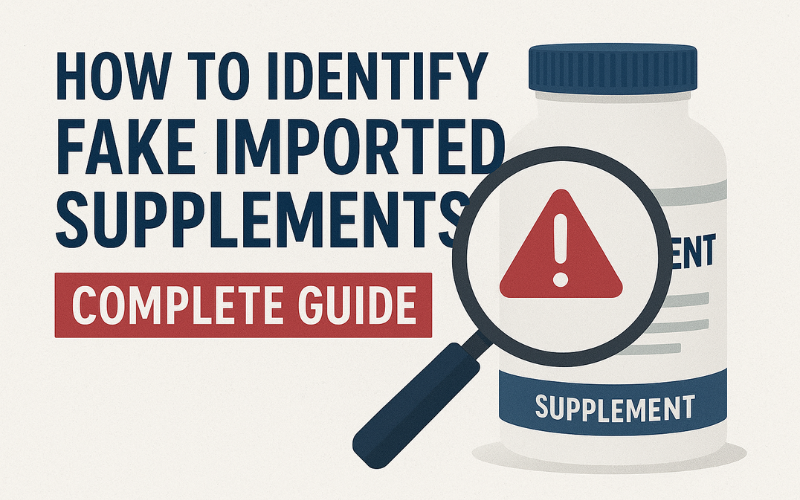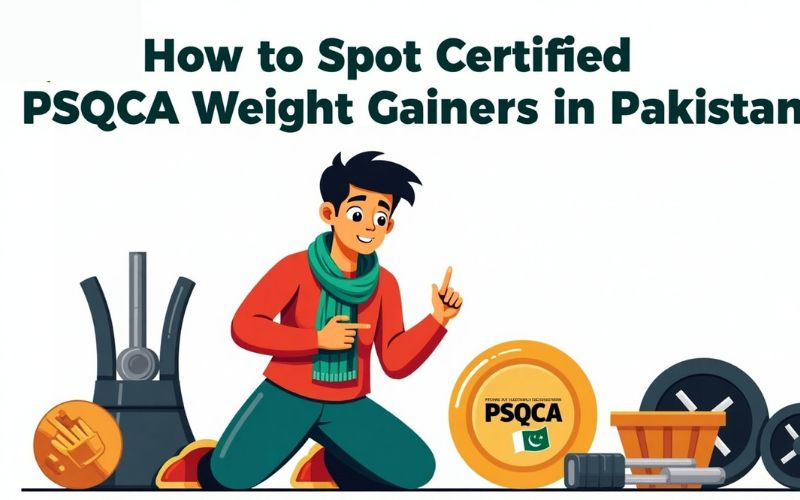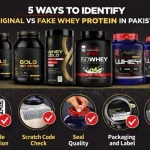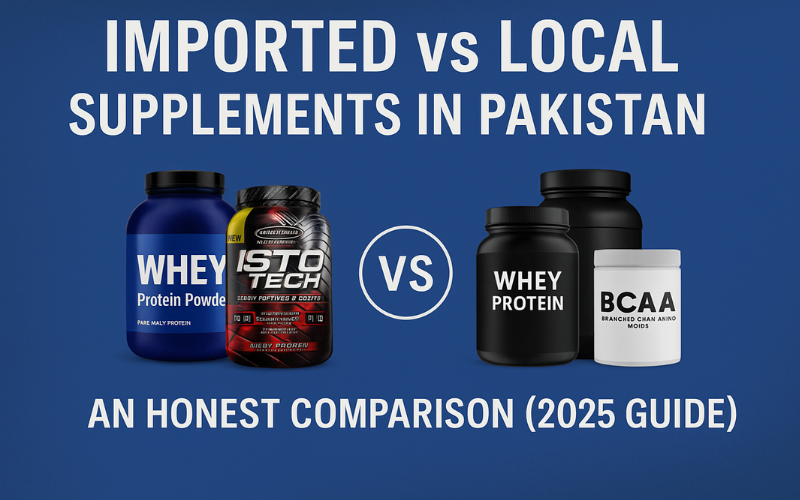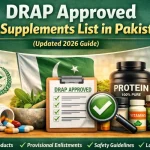The supplement industry in Pakistan has grown rapidly, with millions of fitness enthusiasts, athletes, and health-conscious people relying on protein powders, creatine, and pre-workouts. However, this growth has also created a major issue: counterfeit products. According to market estimates, nearly 80% of imported supplements sold in Pakistan may be fake, expired, or smuggled through grey channels. Fake imported supplements not only waste your money but also put your health at serious risk
Table of Contents
Types of Fake Supplements in the Market
Clearly Fake Products
These are easy to spot. The packaging looks cheap, the labels are full of spelling errors, and the product often sells at extremely low prices. Even beginners can detect these without much effort.
Highly Convincing Fakes
These are more dangerous. Counterfeiters copy original packaging so well that it looks genuine. These require detailed checks like seals, QR codes, distributor verification, and even taste/mixability tests to expose them.
Red Flags That Help Identify Fake Imported Supplements
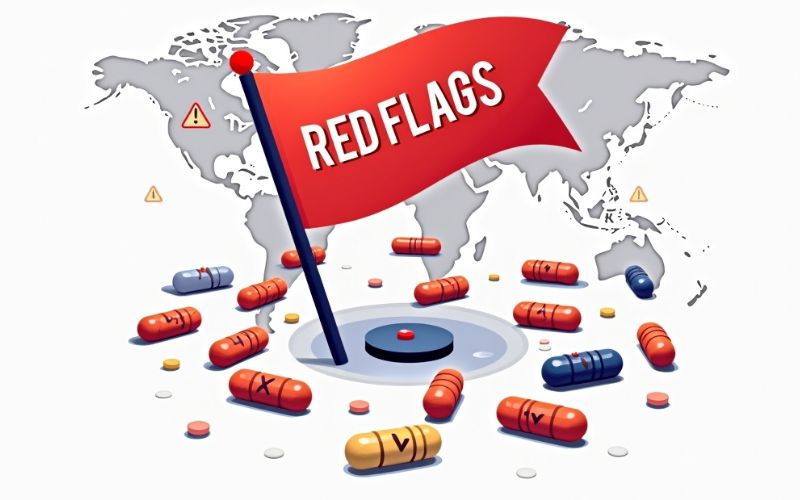
Suspiciously Low Prices
If the price seems “too good to be true,” it usually is. Genuine imported supplements maintain consistent pricing due to shipping and customs. If one seller is offering whey protein at half the market price, it’s most likely fake.
Packaging Errors and Poor Printing
Look for blurred graphics, spelling mistakes, and low-quality containers. Genuine brands maintain premium packaging with consistent fonts, colors, and holograms.
Incorrect Labels, Batch Numbers, or Expiry Dates
Fake supplements often display missing or incorrect manufacturing details. Always check for:
- Batch number
- Lot code
- Manufacturing and expiry dates
Then cross-verify them on the brand’s official website if available.
Broken Seals or Missing Holograms
Original imported supplements always have proper seals, shrink wrap, or holograms. If the seal is loose, broken, or missing altogether, don’t buy it.
Fake QR Codes and Barcodes
Scan the barcode or QR code with your phone. If it doesn’t scan, shows mismatched details, or redirects you to a suspicious website, it’s fake. Brands like Optimum Nutrition and MuscleTech often provide QR verification tools online.
Taste, Texture, and Mixability Issues
Authentic protein powders mix evenly without clumps and taste consistent. Fake powders often taste overly sweet, bitter, or chemical-like. They may form lumps or excessive foam when shaken.
Market Challenges Behind Fake Supplements in Pakistan
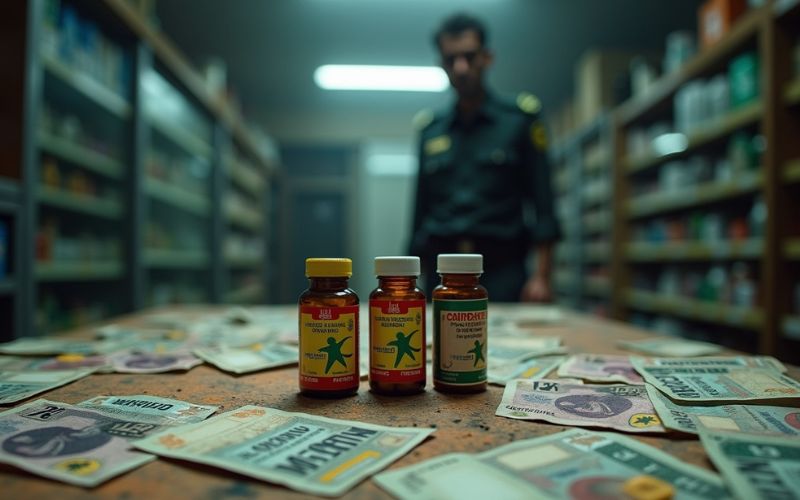
Counterfeit supplements thrive because of market loopholes:
- Import Duty Changes Since 2019: Higher taxes led many sellers to rely on grey-channel imports, opening the door for fakes.
- Smuggling Through Grey Channels: Supplements enter without quality checks, making it impossible to ensure authenticity.
- Lack of Official Distributors: Global brands like Optimum Nutrition, Dymatize, and MuscleTech do not have official representation in Pakistan, which makes counterfeits easier to push into the market.
How to Verify Supplement Authenticity
Check the Brand’s Official Website
Most global supplement brands list their authorized distributors. Visit the official website and confirm whether the seller you’re buying from is on the list.
Contact the Brand Directly
If in doubt, email the manufacturer with the store name and product code. Brands usually reply with confirmation on whether the seller is legitimate.
Look for Certifications and Licensing
Authentic supplements often carry certifications like:
- NSF
- Informed-Sport
- GMP (Good Manufacturing Practices)
- Halal certification
In Pakistan, also look for DRAP (Drug Regulatory Authority of Pakistan) import approvals.
Buy from Trusted Supplement Stores Only
Always purchase from verified, reputed supplement stores that have a track record and social proof. Check customer reviews, physical store addresses, and brand partnerships before buying.
Case Example – Trusted Distributors in Pakistan
For example, The Protein Factory is the exclusive distributor of The Protein Works brand in Pakistan for over six years. Such official partnerships give you peace of mind that you are getting authentic products. If a brand has no authorized distributor, avoid risky sellers and always confirm with the manufacturer.
Checklist – How to Identify Fake Imported Supplements in 2025
Here’s a quick summary checklist you can use before buying:
- ✅ Compare prices with market averages.
- ✅ Inspect packaging quality, logos, and fonts.
- ✅ Verify batch numbers, lot codes, and expiry dates.
- ✅ Check for sealed lids and holograms.
- ✅ Scan QR codes or barcodes for confirmation.
- ✅ Test mixability, texture, and taste if possible.
- ✅ Look for certifications (NSF, GMP, Halal, Informed-Sport).
- ✅ Purchase only from trusted supplement stores.
- ✅ Confirm distributor information on the brand’s official website.
- ✅ Email the brand directly if you’re unsure.
Conclusion – Protect Your Health and Money
Counterfeit supplements are a serious problem in Pakistan’s fitness market. They put your health at risk, waste your money, and damage your fitness progress. The best way to stay safe is by learning how to identify fake imported supplements through price checks, packaging inspection, seal verification, QR scanning, and distributor confirmation. Always buy from trusted stores, look for certifications, and stay updated with brand authenticity tools. By being aware and cautious, you can make sure that every scoop you consume is authentic, safe, and effective.👉 “Buy 100% Authentic Supplements in Pakistan – Shop Now at NutritionalWorld.com.pk














